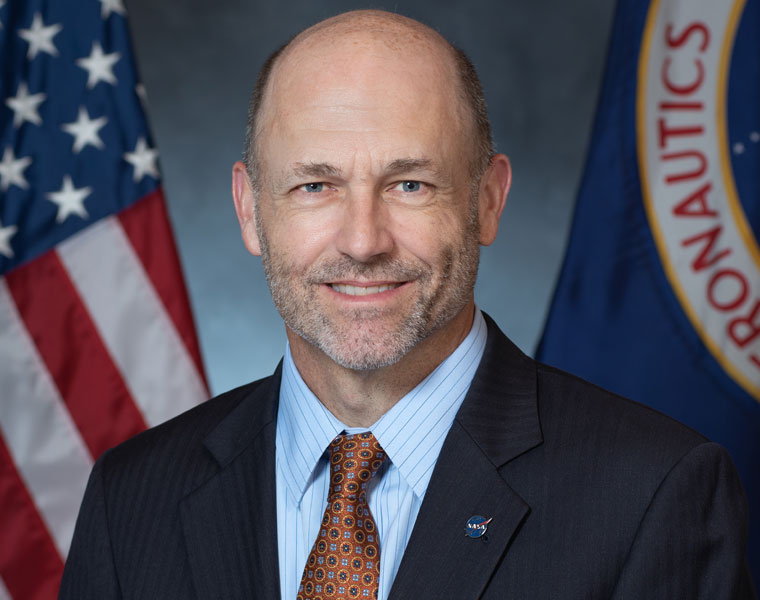As Innovation Week 2024 approaches, the Case Western Reserve University community is looking forward to an exciting week of events. Among them is a kickoff luncheon Monday, Oct. 28, featuring a keynote address from James A. Kenyon, director of NASA’s Glenn Research Center in Cleveland.
As the person responsible for organizing and directing Glenn Research Center’s activities, Kenyon is familiar with having to think on his feet when things don’t go as planned—and knows how to embrace the benefits that may emerge. He’ll address these topics and more in his speech on “Failure and Persistence in Innovation,” the theme of this year’s Innovation Week programming.
The 2024 Faculty Distinguished Research Awards—among the top honors bestowed upon faculty at CWRU—will also be presented during the luncheon. The award, established in 2013, is given annually to faculty members who have made outstanding commitments on a grand scale through their research.
Kenyon received a bachelor’s degree in aerospace engineering from Georgia Tech, a master’s degree in mechanical engineering from Purdue University and a doctorate in mechanical engineering from Carnegie Mellon University.
Read on to learn more about Kenyon and his leadership perspectives, and make plans to hear him speak during the Innovation Week kickoff luncheon. The luncheon will take place at noon in the TVUC ballroom; registration on CampusGroups is required.
Q: How does NASA’s Glenn Research Center approach interdisciplinary collaboration, and why is it important?
A: It starts with the problem and a question: What do we need to do to get there? When we need input from an area that has different disciplines, we call our network of people who have those capabilities. It could be a different organization; it could be a different NASA center. We have such a breadth of talent across NASA that we can tap into for support. Sometimes it’s outside of the agency, too. But the bottom line is to reach out and engage the right people with the right skills. Everything we do that really matters is done by a team, and we need to make sure we have the right people on the team.
Q: What role do you foresee universities playing in shaping the future of innovation and research?
A: There are several key roles universities will play:
- The most obvious is shaping our future workforce: developing the brilliant minds who are going to drive innovation going forward. That’s core to the mission of universities and absolutely essential to the future of innovation.
- Research. Universities have a great deal of flexibility, call it academic freedom, if you will, to dive deep into hard problems, explore and come up with creative solutions. That flexibility doesn’t always exist elsewhere, but it’s important for innovation.
- As universities look forward, they are collaborating more and more outside of their campus and forming partnerships in their communities. At Case Western Reserve, for example, there is Sears think[box] that brings together entrepreneurs and the community. That’s just one example, but we’re seeing more innovation around partnerships and business models.
Q: How would you define failure, and how do you make sure your team learns from those moments?
A: In an innovative environment, a research environment, the only failure is a failure to learn. You can probably expand a little bit with health and safety, but beyond that, the only real failure is a failure to learn. So how do you lead your team through that? You focus on one question: What did you learn? Of course, you have to make sure you’re doing things as smartly as you can, collecting data, monitoring processes, making observations, etc., but those are normally part of the process. But when things don’t go as expected, you can use that information to help you understand why. Sometimes that can be as valuable as if everything went off exactly as planned. But you have to be deliberate, take a step back, and do the work to understand what happened and why.
Q: How do you foster a culture of innovation that allows for persistence through failure?
A: Again, the only real failure is failure to learn. You celebrate learning, regardless of how you did it. When you can build people up and find success in learning, then that makes some of the bumps and bruises along the way worthwhile. After all, we sometimes need to learn the things not to do. At the end of the day, you push forward knowledge, which is our job, and we celebrate when we add to what we know and can do.
Q: What advice do you have for young entrepreneurs?
A: Be willing to take chances. Be persistent. Always have a backup plan. Being an entrepreneur is a hard thing to do. But if you have good ideas, you’re open to learning and you can navigate failures to turn them into successes, you can be successful. It really takes a willingness to fail smartly, a willingness to persist, a willingness to be flexible and adapt. And it takes guts. But the payoff for success can be huge.
About Innovation Week
Innovation Week is an annual celebration of Case Western Reserve University’s innovative and entrepreneurial culture. The 2024 events will take place Oct. 28 through Nov. 1. Registration is required to attend any of the events, including presentations, workshops, tours and pitch competitions. View the full schedule and register for events, and take a look back at highlights from last year’s Innovation Week.

